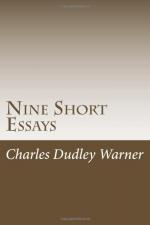Perhaps the most curious and interesting phrase ever put into a public document is “the pursuit of happiness.” It is declared to be an inalienable right. It cannot be sold. It cannot be given away. It is doubtful if it could be left by will.
The right of every man to be six feet high, and of every woman to be five feet four, was regarded as self-evident until women asserted their undoubted right to be six feet high also, when some confusion was introduced into the interpretation of this rhetorical fragment of the eighteenth century.
But the inalienable right to the pursuit of happiness has never been questioned since it was proclaimed as a new gospel for the New World. The American people accepted it with enthusiasm, as if it had been the discovery of a gold-prospector, and started out in the pursuit as if the devil were after them.
If the proclamation had been that happiness is a common right of the race, alienable or otherwise, that all men are or may be happy, history and tradition might have interfered to raise a doubt whether even the new form of government could so change the ethical condition. But the right to make a pursuit of happiness, given in a fundamental bill of rights, had quite a different aspect. Men had been engaged in many pursuits, most of them disastrous, some of them highly commendable. A sect in Galilee had set up the pursuit of righteousness as the only or the highest object of man’s immortal powers. The rewards of it, however, were not always immediate. Here was a political sanction of a pursuit that everybody acknowledged to be of a good thing.
Given a heart-aching longing in every human being for happiness, here was high warrant for going in pursuit of it. And the curious effect of this ‘mot d’ordre’ was that the pursuit arrested the attention as the most essential, and the happiness was postponed, almost invariably, to some future season, when leisure or plethora, that is, relaxation or gorged desire, should induce that physical and moral glow which is commonly accepted as happiness. This glow of well-being is sometimes called contentment, but contentment was not in the programme. If it came at all, it was only to come after strenuous pursuit, that being the inalienable right.
People, to be sure, have different conceptions of happiness, but whatever they are, it is the custom, almost universal, to postpone the thing itself. This, of course, is specially true in our American system, where we have a chartered right to the thing itself. Other nations who have no such right may take it out in occasional driblets, odd moments that come, no doubt, to men and races who have no privilege of voting, or to such favored places as New York city, whose government is always the same, however they vote.




